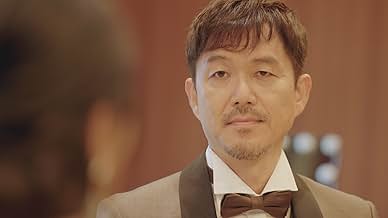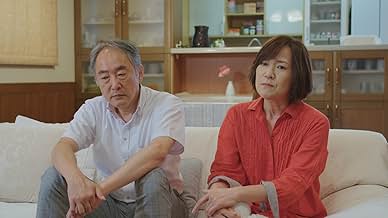NOTE IMDb
7,0/10
1,1 k
MA NOTE
Dans cette série de téléréalité, des célibataires japonais qui rêvent de mariage se rencontrent, se séduisent et se fiancent… avant même de s'être vus.Dans cette série de téléréalité, des célibataires japonais qui rêvent de mariage se rencontrent, se séduisent et se fiancent… avant même de s'être vus.Dans cette série de téléréalité, des célibataires japonais qui rêvent de mariage se rencontrent, se séduisent et se fiancent… avant même de s'être vus.
Parcourir les épisodes
Avis à la une
It will bring to you all the emotions from being strangers thru to the process of getting married from different people's perspective.
Sometimes I feel sweetness, sometimes I feel stress when I put myself in the guys' shoes.
Definitely a must watch. I bet the girls will love this more than a guy do. But I am a guy! :)
I wish they can continue filming their lives but alas, it's not possible as once the love ends, most likely they will never return.
Sometimes I feel sweetness, sometimes I feel stress when I put myself in the guys' shoes.
Definitely a must watch. I bet the girls will love this more than a guy do. But I am a guy! :)
I wish they can continue filming their lives but alas, it's not possible as once the love ends, most likely they will never return.
I like the premise of the first season of the American version, even though some of the contestants were disappointing in their behavior towards their partners. I had an inkling that the Japanese version of the show would be better than that first American version.
What really surprised me was the very healthy mix of contestants by the producers. Most of the contestants truly seemed more interested in being potential marital partners over promoting their own businesses or boosting their social media profiles.
In any matchmaking process, there are always going to be matches that don't work out along the way. An encouraging point is that these participants seem to have learned valuable lessons along the way, even if it didn't translate to forever love in front of the camera.
What really surprised me was the very healthy mix of contestants by the producers. Most of the contestants truly seemed more interested in being potential marital partners over promoting their own businesses or boosting their social media profiles.
In any matchmaking process, there are always going to be matches that don't work out along the way. An encouraging point is that these participants seem to have learned valuable lessons along the way, even if it didn't translate to forever love in front of the camera.
Love is Blind Japan presents a captivating departure from the familiar dramatic flair of its American and Swedish counterparts. Unlike the exaggerated narratives that often overshadow sincerity in those versions, the Japanese adaptation offers a refreshing authenticity. Contestants in the Japanese version exhibit a keen awareness of their conversations, emphasizing meaningful dialogue over scripted drama.
One notable aspect is how conflicts are approached with artful skill and respect, showcasing a cultural nuance that adds depth to the show. The contestants, in their pursuit of love, demonstrate an admirable commitment to genuine connections. In a television landscape saturated with manufactured drama, Love is Blind Japan stands out as a more serious and realistic social experiment.
The subdued and muted demeanor of the participants contributes to a less theatrical, more realistic portrayal of relationships. The editing, too, reflects a commitment to authenticity, creating an immersive viewing experience. This Japanese adaptation feels less predictable than its American counterpart, providing a refreshing and unpredictable take on the familiar reality TV formula. For those seeking a departure from the norm, Love is Blind Japan offers a thoughtful and nuanced exploration of love and relationships. The cultural nuance in conflict resolution, although admirable, might not resonate with audiences seeking the thrill of more confrontational shows. The show's commitment to authenticity, while commendable, may inadvertently contribute to a less engaging viewing experience for some.
In the grand landscape of reality TV, where sensationalism often reigns supreme, Love is Blind Japan earns points for sincerity but might lose others for perceived boredom. Its unique approach may appeal to those craving a more realistic portrayal of relationships, but it could leave others longing for the exaggerated drama characteristic of many reality shows.
Considering the mix of cultural depth and potential dullness, the show earns a modest verdict of 6.5. While it offers a different flavor of reality TV, its appeal may be subjective, catering to those who appreciate subtlety in love stories but falling short for those seeking more traditional entertainment. Making it boring and uninteresting.
One notable aspect is how conflicts are approached with artful skill and respect, showcasing a cultural nuance that adds depth to the show. The contestants, in their pursuit of love, demonstrate an admirable commitment to genuine connections. In a television landscape saturated with manufactured drama, Love is Blind Japan stands out as a more serious and realistic social experiment.
The subdued and muted demeanor of the participants contributes to a less theatrical, more realistic portrayal of relationships. The editing, too, reflects a commitment to authenticity, creating an immersive viewing experience. This Japanese adaptation feels less predictable than its American counterpart, providing a refreshing and unpredictable take on the familiar reality TV formula. For those seeking a departure from the norm, Love is Blind Japan offers a thoughtful and nuanced exploration of love and relationships. The cultural nuance in conflict resolution, although admirable, might not resonate with audiences seeking the thrill of more confrontational shows. The show's commitment to authenticity, while commendable, may inadvertently contribute to a less engaging viewing experience for some.
In the grand landscape of reality TV, where sensationalism often reigns supreme, Love is Blind Japan earns points for sincerity but might lose others for perceived boredom. Its unique approach may appeal to those craving a more realistic portrayal of relationships, but it could leave others longing for the exaggerated drama characteristic of many reality shows.
Considering the mix of cultural depth and potential dullness, the show earns a modest verdict of 6.5. While it offers a different flavor of reality TV, its appeal may be subjective, catering to those who appreciate subtlety in love stories but falling short for those seeking more traditional entertainment. Making it boring and uninteresting.
I love cultural diversity so it's a gift to see "Love is Blind" in different cultures. I was happy to see some of the cultural differences in the Japanese series and would have loved to see more
for example traditional clothing. It was interesting to see how the couples communicate especially when engaging in a serious conversation. It was also neat to see how there was an important focus on being respectful in this culture. At times the show was a bit dry and slow but then would grab my attention and pull me back in. I felt like a few women were more focused on promoting their talents on the show than falling in love. Some of the overdubs were awful, especially the one that sounded like a little girl. This was especially creepy because under the overdue you can hear that she has a deeper adult voice. Overall I enjoyed this season of Love is Blind Japan.
Not only did the people act in a much classier way (such as not swearing, not talking about their sex lives, wearing more modest clothes) but they acted nicer to each other and it showed in the friendships formed in the female/male groups. I felt I learned a lot about Japanese culture and how it has changed over the last decades. For example I was surprised that these couples easily wanted to live together immediately as I thought that was still kind of taboo in Japan. I really felt the emotions were very real in this show, especially when the men would cry / be upset. It made me sad when one of them was crying, man or woman and I felt sorry for the couples who broke up early on, but was glad it wasn't up at the alter like the American version. That made it also seem more realistic. And the couples that made it through were so adorable. I really hope there will be a season 2 of this version. My favorite part in each show is the wedding gown try ons and the wedding scenes, the women look so beautiful.
Le saviez-vous
- AnecdotesContestant Priya is Priya Yoshikawa, who was Miss World Japan in 2016.
Meilleurs choix
Connectez-vous pour évaluer et suivre la liste de favoris afin de recevoir des recommandations personnalisées
- How many seasons does Love Is Blind: Japan have?Alimenté par Alexa
Détails
- Date de sortie
- Pays d’origine
- Site officiel
- Langue
- Aussi connu sous le nom de
- Love is Blind: Japan
- Lieux de tournage
- Société de production
- Voir plus de crédits d'entreprise sur IMDbPro
Contribuer à cette page
Suggérer une modification ou ajouter du contenu manquant

Lacune principale
By what name was Love Is Blind: Japan (2022) officially released in the United States?
Répondre

























